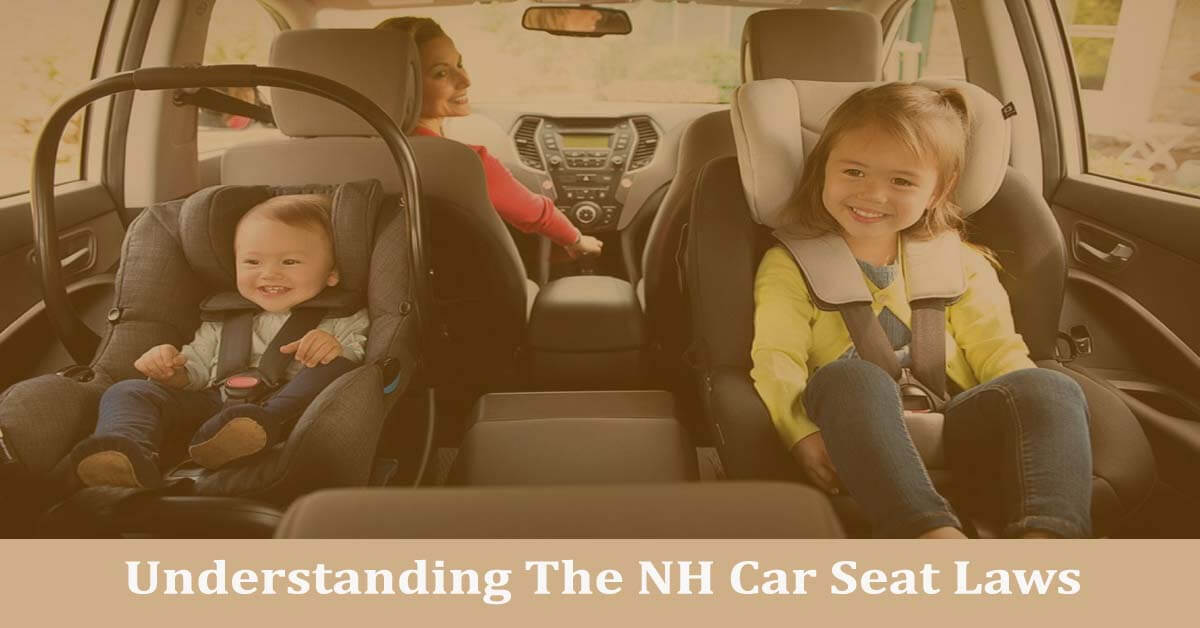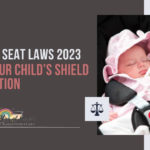Car accidents can happen at any moment, and ensuring that children are correctly secured in a vehicle is not just a legal requirement but a vital measure to protect their lives.
Like many other states, New Hampshire has established strict regulations regarding child passenger safety to reduce the risk of injury or harm in the event of a collision.
Whether it’s a short trip to the grocery store or a long journey across state lines, the importance of child passenger safety cannot be overstated.
Browse this Post
- 1 An In-Depth Look at New Hampshire’s Car Seat Laws: Navigating Child Passenger Safety
- 2 Rear-facing NH Car Seat Law
- 3 Forward-facing NH Car Seat Law
- 4 Booster NH Car Seat Law
- 5 Riding in the Front Seat in NH: Safety of Child Passengers
- 6 NH Car Seat Law Regarding Leaving Child In Car Alone
- 7 FAQs For Nh Car Seat Laws
- 8 Conclusion
- 9 More Resources on Car Seat Laws
Child safety in vehicles is of utmost importance, and keeping up-to-date with the latest regulations and recommendations is crucial to protect your child while traveling.
New Hampshire’s car seat laws specify the appropriate types of car seats, booster seats, and restraint systems based on a child’s age, weight, and height.
According to the New Hampshire Department of Justice,
“New Hampshire law requires that any child under the age of eighteen riding as a passenger in a motor vehicle be secured by either a seat belt or a child safety seat and that any child under the age of seven be secured by an approved child restraint (RSA 265:107-a).”
For children who are aged seven and older but are still under the age of eighteen, New Hampshire law requires them to be secured with a seat belt while riding as passengers in motor vehicles.
This means that older children and teenagers should also be properly restrained for their safety.
Rear-facing NH Car Seat Law
American Academy of Pediatrics suggests that,
“All infants and toddlers should ride in a rear-facing car safety seat (CSS) as long as possible until they reach the highest weight or height allowed by their CSS’s manufacturer. “
New Hampshire law may specify specific requirements for child restraint systems.
The minimum requirement of 12 months to 2 years in NH car seat law is a good starting point, but extending the rear-facing period beyond the age of 2 is even safer.
Rear-facing car seats provide better support for a child’s head, neck, and spine in a crash, which is especially important for infants and toddlers whose bodies are still developing.
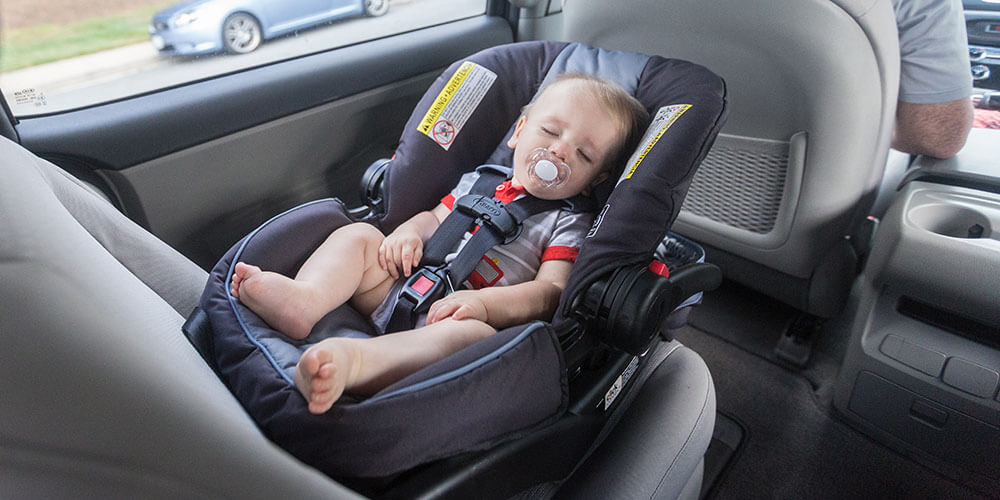
Forward-facing NH Car Seat Law
Using a forward-facing car seat with a harness until the child reaches the weight or height limit of the harness is indeed a standard practice to ensure the child’s safety while traveling in a vehicle.
The weight limit for harnesses in forward-facing seats typically ranges from 40 to 90 lbs or more, but it varies depending on the seat model.
The harness in forward-facing car seats provides additional protection by securely restraining the child during a crash. It helps minimize the stress on the child’s neck, chest, and shoulders, reducing the risk of serious injuries.
The harness limits the child’s forward movement in a collision. This is especially important because it prevents the child from being propelled forward into the vehicle’s interior or the seat in front of them.
Booster NH Car Seat Law
Booster seats are a critical transitional stage from forward-facing car seats in child passenger safety, and they serve several crucial functions to ensure a child’s safety during car travel.
Booster seats typically have weight limits that can vary by brand and model. Its weight limit is up to 110 pounds, but it is essential to follow the specific weight limits provided by the manufacturer of the booster seat you are using.
These limits can vary, and it’s crucial to transition to a high-back or backless booster seat when the child reaches the maximum weight limit of their current booster seat.
Booster seats are designed to elevate a child, allowing the vehicle’s seat belt to fit them correctly. This means the lap belt should sit low and snug across the child’s hips, and the shoulder belt should cross their chest and shoulder.
Proper positioning ensures that the seat belt provides effective restraint and reduces the risk of injury in a crash.
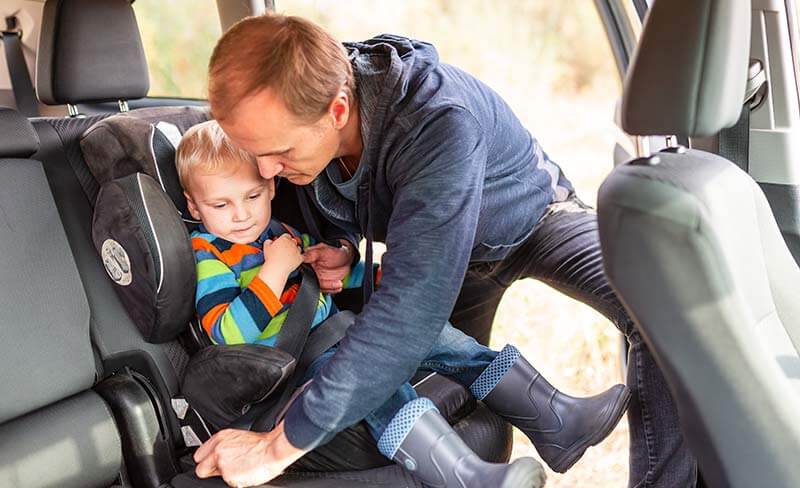
Riding in the Front Seat in NH: Safety of Child Passengers
No specific law regarding this is available, but many safety organizations, including the National Highway Traffic Safety Administration (NHTSA), recommend that children remain in a vehicle’s back seat until they meet specific criteria.
They indicate that children must be physically and developmentally ready to ride in the front seat.
Until the children reach at least the age of 13, it is generally recommended that they ride in the back seat. They should typically weigh at least 80 pounds before transitioning to the front seat, and the height requirement is often set at 4’9″.
The back seat of a vehicle provides additional protection for passengers, especially for children and smaller individuals. These components include:
Windshield: In a front-end collision, the windshield is one of the first impact points. Passengers in the front seat are more likely to be thrown toward the windshield during a crash, increasing the risk of head and upper body injuries.
Airbag: While airbags are crucial safety devices designed to protect adults in the front seats, they deploy with considerable force and can cause injury to smaller individuals if they sit too close to the airbag.
The back seat provides a safer distance from the airbag deployment zone.
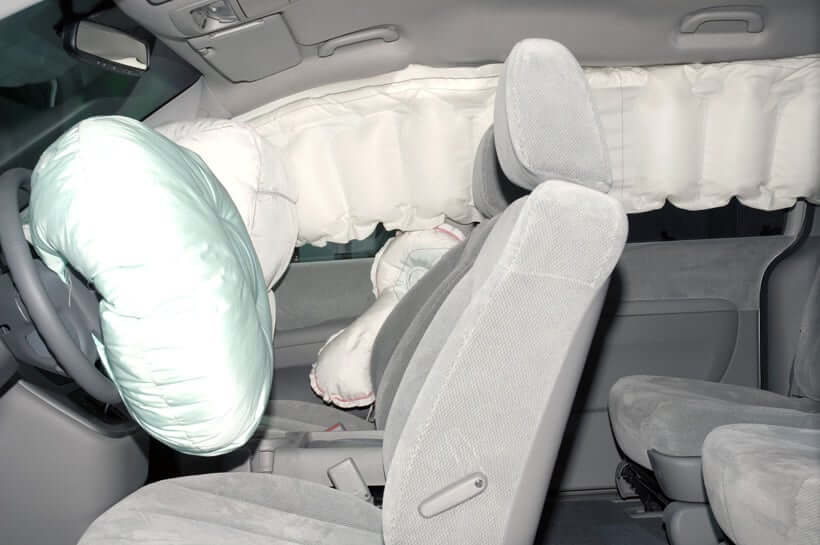
Dashboard: The dashboard is another hard surface in the front of the vehicle that can cause injury upon impact. Passengers in the front seat, especially the front passenger, are at a higher risk of coming into contact with the dashboard during a collision.
NH Car Seat Law Regarding Leaving Child In Car Alone
In 2017, a news site published that,
“A New Hampshire mother is facing charges after allegedly leaving her child in the car while she went shopping…police said in those 30 minutes, something awful could have happened to Dambaeva’s 2-year-old son, Matthew.”
-By Katherine Underwood, News Worthy of You
That means leaving a child unattended in a vehicle, even for a short period, can be extremely dangerous, and it’s considered a severe offense in NH car seat law.
Even if the intention is a quick errand, unforeseen circumstances can arise that may risk the child’s safety. Authorities take such cases seriously to protect the welfare of children.
FAQs For Nh Car Seat Laws
What Are The Upcoming Changes in NH Car Seat Laws?
New Hampshire’s Governor and Legislature passed a bipartisan bill in 2023 requiring children to be in rear-facing car seats until at least two years old, starting from 1/1/2024. It’s great to see bipartisan cooperation in making such important decisions for the welfare of children.
Is There Any Taxi Car Seat Law in NH?
It’s essential for parents and caregivers to be aware that in New Hampshire, taxi drivers are not responsible for providing child seats. Ensuring the safety of young passengers in a taxi is the responsibility of the parents or caregivers.
It’s highly recommended that you arrange an appropriate car seat for your child before traveling in a taxi. Here is more car seat in a taxi.
Is It Illegal To Smoke In A Car With A Child In NH?
New Hampshire Bill HB 230 from 2019 aimed to make it illegal to smoke in a vehicle if there was a passenger under the age of 16 present. Bills like HB 230 are often introduced as measures to protect the health and well-being of children by reducing their exposure to secondhand smoke.
What Are The Consequences Of Not Complying With New Hampshire’s Car Seat Laws?
In New Hampshire, failing to have a child passenger “buckle up” in accordance with car seat and seat belt laws can result in fines. The penalties for a first offense typically include a fine of $50; for a second offense, the fine may increase to $100.
Conclusion
To conclude, New Hampshire’s car seat laws empower parents and caregivers with the knowledge and tools to protect their young passengers. Understanding and complying with these laws is not just about avoiding fines; it’s about ensuring the safety and well-being of children.
Staying informed about the specific requirements for child passenger safety and following best practices can significantly reduce the risks associated with car travel for children.
More Resources on Car Seat Laws
My name is Olivia Brown, and I’m a New York-based blogger and stay-at-home parent. Former business executive enjoying retirement and time with kids Lily and Max. On my blog, I review things for kids and offer my honest thoughts and insights to other parents who may be having the same or similar experiences.

